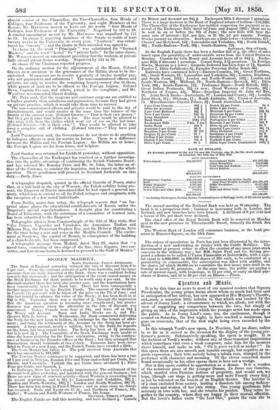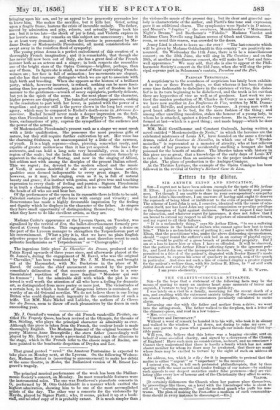SOrntrto an Mlusir.
It is by this time no neNts to most of our musical readers that Signora Piccolomini, the yottng prima donna about whom so much had been said in anticipation of her arrival, has new appeared at Her Majesty's Theatre, and.made a sensation little inferior to that which was created by the advent of Jenny Lind : a circumstance to Which we allude, not with the view of suggesting any comparison between the two, but simply of giving an idea of the impression which the younger artist has made upon the public. As in Jenny Lind's case, too, the excitement, though it seemed on Saturday, the first night, to have reached a maximum, has gone on crescendo, that of the first night being even exceeded by the third.
In this triumph Verdi's new opera, Ia Trariata, had no share, unless in so far as it served as the occasion for the display of the young per- formees powers. Substantively speaking, the opera is nought. It is the feeblest of Verdi's works; without any of those transient inspirations which sometimes visit even a weak composer, raise him for the monient above himself, and make us ash, Oa le genie va-t-il se nicher F" In this opera there are airs smooth and tunable enough, but negative ful re- gards expression ; their trite melody: being a tabula rasa, stamped by the performer with character and meaning. Of the clever concerted musie found occasionally in his other operas there is here not a vestige. ' Nor is this opera entitled to approbation as a drama. It is a versibn of the notorious piece of the younger Dumas, La _Dame our Camaias, which startled even Parisian notions of propriety, and would not, we hope, (though our stage is getting more and more French every day?) as yet be tolerated on the boards of on English theatre. The heroine is of a class excluded from society, leading a dissolute life among fashion- able roués and women of her own stamp. One young gentlemen falls seriously in love with her, and she returns his passion. They retire to- , gether to the country, where they are happy in their mutual affection. But the lover's father visits "the Lost One," paint$ the ruin she ' is
bringing upon his son, and by an appeal to her generosity persuades her to leave him. She makes the sacrifice, but it kills her. Grief, acting 'alien a fragile frame, hastens the crisis of incurable malady. The father, moved by admiration and pity, relents, and actually brings back his son but it is too late—the shock of joy is fatal, and Violetta expires in her lover's arms. Any remarks on this subject are unnecessary; but it is at least very dramatic ; and when the heroine is personated by Ma- dame Doche or Mademoiselle Piccolomini, all moral, considerations are swept away in the resistless flood of sympathy:
The young prima donna is a perfect embodiment of this creation of a thoroughly French imagination ; and, it is remarkable that though she has never till now been out of Italy, she has a great deal of the French manner both as an actress and a singer • in both respects she resembles :one of the bright stars of the Opera COmique—brighter, perhaps, than any of them. In figure she is small, as most of these captivating French- women are ; her face is full of animation ; her movements are elegant, and she has that tournure distinguee which we are apt to associate with high birth and breeding. When she appears as the hostess of a brilliant party, which, however incorrect, is refined, nothing can be more fasci- nating than her graceful courtesy-, mixed with a sort of freedom in her manner to the gentlemen—a touch of saucy esideglerie, perfectly delicate, but yet in the spirit of the scene. In the next phase of the character, higher powers are displayed. The tumultof contending passions, ending in the resolution to part with her lover, is painted with the power of a tragedian : and greater still is the power shown in the long last scene of agony, which may be compared to Rachel's death-scene in Adrienne Le- couvreur. Rachel herself never made a deeper impression on the feel- ings than Piccolomini is now doing at Her Majesty's Theatre. Sighs, tears, exclamations of pity, express the sympathies of the audience and The power of the actress, Of Mademoiselle Piceolomini's present rank as a singer we must speak -with a little 'qualification. She possesses the most precious gifts of nature, but they still require further cultivation by art. Her voice has the charming freshness, not unaccompanied by a little of the rawness, of youth. It is a high soprano—clear, piercing, somewhat reedy, and capable of greater mellowness than it has yet acquired. She has a fine sostenuto,,and can hold a long note very beautifully, even in a lofty region of-the scale; but she lacks that finished execution formerly so apparent in the singing of Sontag, and -now in the singing of Alboni, but seldom Met with among the -disciples of the present 'Winn schooL This we regret ; for, devoted. to the modern school and the music of Verdi, it seems doubtful if she will ever acquire those artistic qualities once deemed indispensable to every great singer. Be this, however, as it may, her singing, even as it is, is full of natural beauty and grace ; it is instinct with genius, and gives true and touching expression to every shade of feeling and passion : Signora Plecolomini is in truth a. charming little person, and it is no wonder that she turns the heads of all who see-and hear her.
Of the performance of the-opera in its ensemble there is little to be said. Galzolari sustains the part of the lover with energy and vivacity ; and Beneventano has made a highly favourable impression by the feeling and dignity which he displays in the character of the father. As singers they have small opportunity of distinguishing themselves ; but they do what they have to do like excellent artists, as they are.



























 Previous page
Previous page